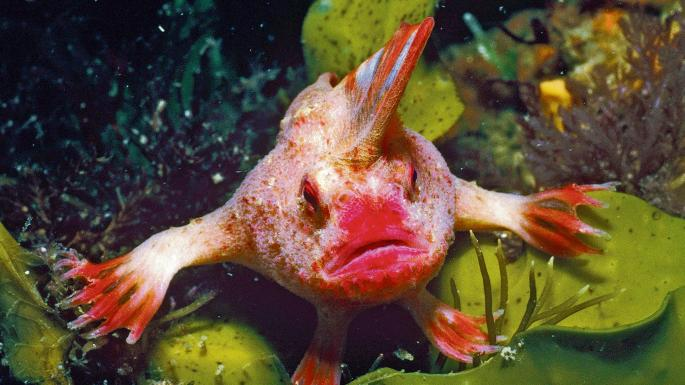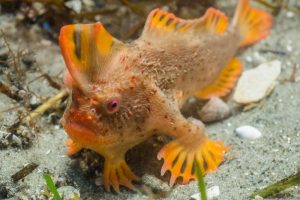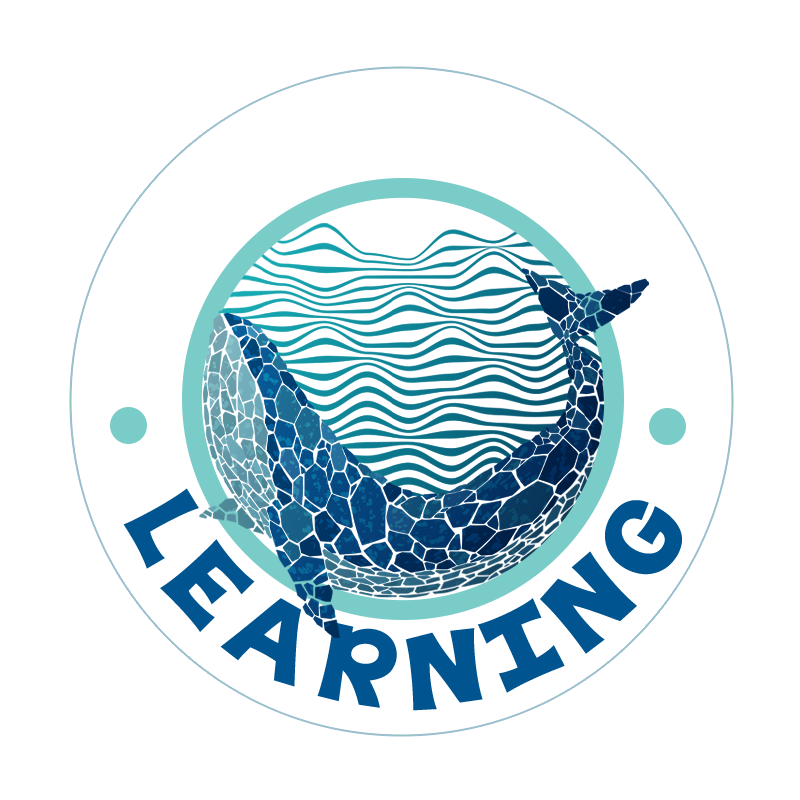
Red Handfish
Hands Down
The Red Handfish is an extremely rare reef fish that doesn’t swim around the Tasman Sea (between Australia and New Zealand). Instead, it walks on its distinctively hand-like fins. It is considered one of the rarest fish in the world, with only 20 to 40 individuals known in a single population. But in late 2017 a diver spotted one of the rare creatures off the southeast coast of Tasmania and alerted the University of Tasmania’s Institute for Marine and Antarctic Studies (IMAS). Scientists from IMAS and the citizen science organization Reef Life Survey then went out for a closer look.
Antonia Cooper, a researcher at IMAS, and her team spent hours in the water and were about to call off the mission when they finally spotted one. After that first sighting, the divers spent another 30 combined hours in the water, and eventually identified a total of eight red handfish swimming—or scurrying, rather—around an area of over 900 square meters.
 What’s especially interesting about this new population is that it lives in a different habitat several miles away from the other known population. “This second population is a huge relief; it effectively doubles how many we think there on the planet,” Stuart Smith added. “It also gives hope that there may be other populations out there.” The small, colorful fish are not built for long-distance swimming, so it’s likely the newly discovered population is genetically different from the original one.
What’s especially interesting about this new population is that it lives in a different habitat several miles away from the other known population. “This second population is a huge relief; it effectively doubles how many we think there on the planet,” Stuart Smith added. “It also gives hope that there may be other populations out there.” The small, colorful fish are not built for long-distance swimming, so it’s likely the newly discovered population is genetically different from the original one.
Named for their hand-shaped fins, red handfish are benthic ocean dwellers that crawl on the seafloor with their limbs. They grow to be between two and five inches long, and they eat small crustaceans and worms. Red handfish actually come in two color variations—one a bright red and the other marked by red embellishments. They were first seen near Port Arthur on the Tasman Peninsula in the 1800s.
Sources:
- https://news.nationalgeographic.com/2018/01/rare-red-handfish-endangered-tasmania-hobart-bay-spd/
- https://www.atlasobscura.com/articles/found-new-population-rarest-fish-red-handfish-citizen-science?utm_source=facebook.com&utm_medium=atlas-page
- https://www.sciencealert.com/world-s-rarest-fish-doubled-known-population-hands-red-handfish-thymichthys-politus
Curriculum Reference Links
- Biological World / Sustainability / 10: Students should be able to evaluate how humans can successfully conserve ecological biodiversity and contribute to global food production; appreciate the benefits that people obtain from ecosystems
[wpc_button]
